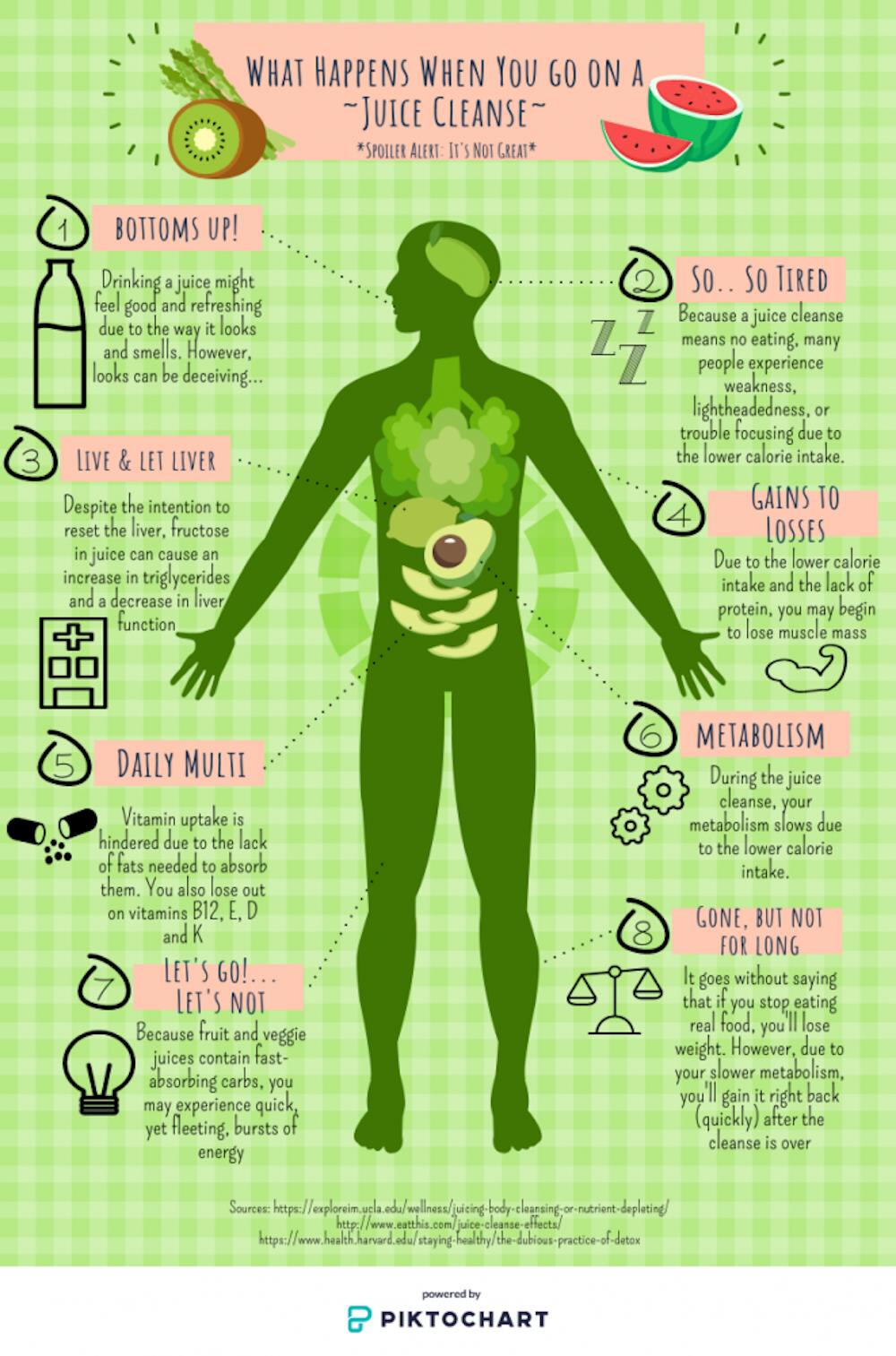Juice cleansing, a fad diet that has found its way to ASU’s Tempe campus at the restaurant Freshii, is said to be a way to detox the body, reboot the metabolism and lose weight.
However, these supposed fast-acting health fads actually might cause more harm than good.
Students should avoid participation in extreme low-calorie diets such as juice cleanses that can impact physical health, energy levels, concentration and mental health.
Christina Barth, a lecturer at ASU’s School of Nutrition and Health Promotion, said that fad diets such as juice cleansing often have negative repercussions.
“Whenever people restrict specific foods or even macronutrients or specific food groups, they’re somewhat setting themselves up for deprivation,” Barth said. “When we deprive ourselves of the foods that we should enjoy eating, people then tend to overindulge, which leads to binge eating and then this whole vicious cycle of going on these crazy low-calorie fad types of diets.”
Freshii offers three juice cleanse programs, lasting one day, three days or five days. Each plan includes four juices plus one salad per day.
However, all of these juices contain only fruits and vegetables, meaning students will lose out on protein, fiber, vitamins and the majority of their calories.
“They lose the weight — mostly water weight and even muscle — and regain the weight because their metabolism slows down,” Barth said.
The sale of juice cleanses on campus promotes unhealthy behavior and is more harmful than innocuous to both physical and mental health.
Sophia Saad, an ASU freshman studying biological sciences, tried a juice cleanse from Nékter but said she would likely not repeat it due to her fitness-centric lifestyle.
“For me personally, I intake so much protein that doing the cleanse just made me crave more protein, and the next day I felt like I had to double up on it to repay,” Saad said. “I probably wouldn’t do it again, just because of what I’m doing every day with training with CrossFit and trying to recover fast. I need to be able to eat a certain amount of protein and I have macros that I need to follow.”
Many students are inclined to try juice cleanses just for the sake of trying something new on campus, but they should be cautious when it comes to their health.
Melinda Johnson, clinical associate professor in ASU’s School of Nutrition and Health Promotion, said students should also be wary of marketing tactics for health fads.
“The terminology they use is very powerful,” Johnson said. “When they call it a ‘cleanse,’ I think it’s important for people to realize that you’re being marketed to. This is not actually cleansing your body, but they put that term on there to sell you a product. We like that feeling of ‘oh, its cleansing my body, I want to do that,’ but it’s not actually doing that — it’s just a marketing term.”
The advertisement of juice cleanses to college students could also be potentially detrimental, especially in the face of disordered eating or body image issues.
Johnson said her main concern was for college-aged women she works with who are on the verge of developing an eating disorder.
"When you’ve got a situation like that … something like a juice cleanse is not healthy at all for that person’s mental health," Johnson said. "Very often, it pushes her — and sometimes him — down a slippery slope of disordered eating.”
In the ASU student body, 62 percent of students reported that they were trying to gain or lose weight, and of those individuals, 89 percent used diet or exercise to accomplish their goals.
Students with health inquiries or who are struggling with body image should turn to other resources on campus, such as Sun Devil Dining Nutrition or ASU Health Services, rather than spend hundreds on routine juice cleanses and other fad diets that will harm their physical and mental health.
“You can spot a fad diet by looking for these rigid rules about ‘eat this, don’t eat this,’" Johnson said. "A lot of times, a diet will exaggerate benefits, so when a juice drink is calling itself a ‘cleanse,’ to me that’s a very clear indicator that this is a fad diet that’s exaggerating a benefit."
ASU students should resist the temptation to hop on the bandwagon of fad diets and prioritize their own health.
“I don’t advocate for (using juicing as a diet)," Barth said. "I think our bodies naturally detox by themselves, and so I encourage people to choose more of an unprocessed or low processed type of eating plan for whole foods.”
Reach the columnist at kalbal@asu.edu or follow @KarishmaAlbal on Twitter.
Editor’s note: The opinions presented in this column are the author’s and do not imply any endorsement from The State Press or its editors.
Want to join the conversation? Send an email to opiniondesk.statepress@gmail.com. Keep letters under 500 words and be sure to include your university affiliation. Anonymity will not be granted.
Like The State Press on Facebook and follow @statepress on Twitter.





